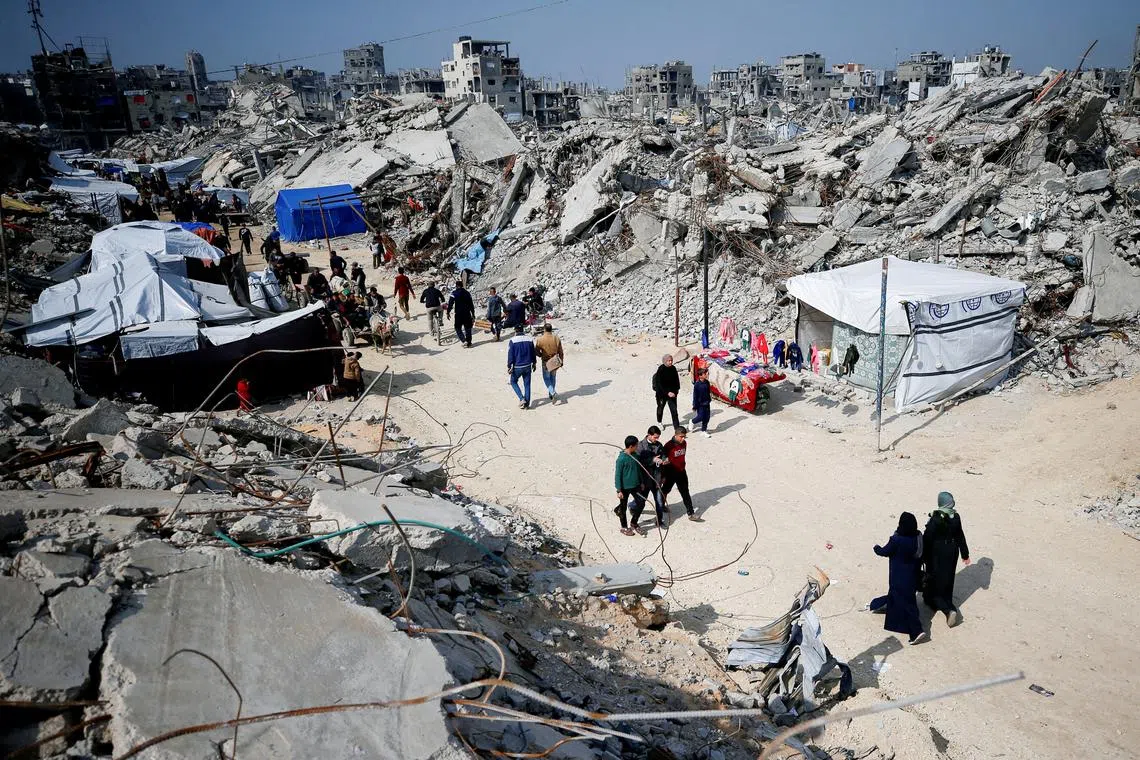Israel to begin negotiations on second phase of Gaza ceasefire deal in coming days, says minister
Sign up now: Get ST's newsletters delivered to your inbox

Israel had given mixed signals in the past few weeks over its engagement in the talks over the next stage of the three-phased ceasefire.
PHOTO: REUTERS
Follow topic:
JERUSALEM - Israel and Hamas will begin indirect negotiations on the second stage of the Gaza ceasefire deal, officials said on Feb 18, as the Palestinian militant group said it would hand over more hostages, including the bodies of two children, this week.
Khalil al-Hayya, Hamas’ leader in Gaza, said the bodies of four hostages, including those of the Bibas family, would be returned on Feb 20. Six living hostages would follow on Feb 22.
Israeli Prime Minister Benjamin Netanyahu’s office confirmed a deal was reached in Cairo to secure the release of six living hostages on Feb 22, four dead hostages on Feb 20, and four more next week, but stopped short of naming any of them.
An Israeli official said the dead hostages will undergo identification in Israel before they are named.
Negotiations for the second phase of the deal were supposed to start on Feb 2 but Qatar – which, together with Egypt and the US, is mediating between the sides – said the talks have not officially started yet.
“It will happen this week,” Israeli Foreign Minister Gideon Saar told a press conference in Jerusalem.
Israel had given mixed signals in the past few weeks over its engagement in the talks over the next stage of the three-phase ceasefire, which came into effect on Jan 19 with the stated goal of permanently ending the Gaza war.
The Bibas family, including Kfir Bibas, who was less than a year old when he was abducted, and his brother Ariel, who was four years old at the time, have been among the highest-profile Israeli hostages seized in the Oct 7, 2023, attack by Hamas.
Their father, Mr Yarden Bibas, was released in February, but their mother Shiri was not. Hamas said in late 2023 that Shiri and the children had been killed in Israeli bombardments.
Israel has not confirmed their deaths, and has only said that it has grave concern for their lives. After Hamas’ announcement, it appealed for people to respect the hostage families’ privacy.
The family said it was “in turmoil” since the announcement by Hamas. “Until we receive definitive confirmation, our journey is not over,” it said in a statement.
The identity of the fourth deceased hostage has not yet been announced, but the families of the six living hostages to be released on Feb 22 have been informed.
Mr Eliyah Cohen, 27; Mr Tal Shoham, 40; Mr Omer Shem Tov; 22, and Mr Omer Wenkert, 23, were all taken hostage on Oct 7. Two others – Mr Hisham Al-Sayed, 36; and Mr Avera Mengistu, 39 – crossed over into Gaza independently of each other around a decade ago and have been held since then.
Negotiation over second phase
The initial phase of the ceasefire deal, which includes a 42-day truce and the return of 33 Israeli hostages in exchange for hundreds of Palestinian prisoners and detainees, has remained on track despite a series of setbacks and accusations of violations that had threatened to derail it.
But negotiations over the second stage are expected to be tough because they include issues like the administration of post-war Gaza, on which large gaps between both sides appear to persist.
“We will not accept the continued presence of Hamas or any other terrorist organisation in Gaza,” Mr Saar said.
But he added that if the negotiations are constructive, Israel will remain engaged and may prolong the first phase of the ceasefire, which is meant to last six weeks.
“If we will see there is a constructive dialogue with a possible horizon of getting to an agreement, (then) we will make this timeframe work longer,” Mr Saar said.
So far, 19 Israeli hostages have been returned in exchange for the release of hundreds of Palestinian prisoners and detainees.
The hostages were taken in the Hamas-led cross-border attack on Oct 7, 2023,
Israel’s retaliatory assault on Gaza has killed more than 48,000 people, according to Palestinian health officials, laid waste to much of the enclave and displaced hundreds of thousands of residents.
An Israeli official said Israel will start allowing the entry of mobile homes for Gazans forced to shelter from the winter weather among the ruins left by 15 months of Israeli bombardments.
Hamas has accused Israel of delaying the delivery and had threatened to postpone the release of hostages until the issue was resolved.
The fragile ceasefire deal has been overshadowed by US President Donald Trump’s call for Palestinians to be moved out and for Gaza to be taken over
The plan has been rejected by Palestinian groups, Arab states and Washington’s Western allies, who say it is tantamount to ethnic cleansing. Israeli leaders have argued that Gazans who want to leave the devastated enclave should be allowed to do so.
Israeli Defence Minister Israel Katz said on Feb 17 that he will set up a new unit in his ministry dedicated to facilitating the exit of Gaza residents who want to move to a third country, after reviewing an initial plan for it. REUTERS

